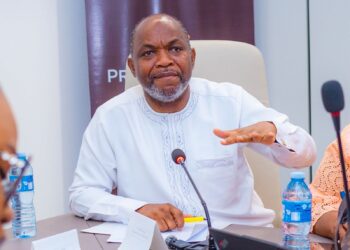By Seyi Bakare
There is something phenomenal going on in Ogun State, and even critics and naysayers are beginning to realize the futility of their campaigns of calumny.
In just three years, the Dapo Abiodun administration, maligned because of its embrace of a paradigm shift away from the practice of concentrating projects either in the state capital or in major cities, is beginning to receive due applause as the cloud of falsehood makes way for a true appreciation of the marked difference made in the lives of the Ogun people.
True, those unfamiliar with Ogun State may not know all that is happening: often, people coming from Lagos do not enter into the heart of Abeokuta.
And if they pass through Ijebu-Ode or Shagamu, they take the expressway, enjoying the new lease of life infused into inter-state travel.
But then many are beginning to see beyond the Shagamu Interchange and the Lagos-Abeokuta expressway, realizing that so many things are happening across the three senatorial districts.
As many a commentator has begun to acknowledge, one marked difference between the current administration and the immediate past one is that Governor Dapo Abiodun has distributed development evenly across the state.
Previously, you only saw beautiful roads in major cities in the state while other areas were virtually left to rot. But now, it is a different situation entirely.
When he came on board, Governor Abiodun discovered that all the major roads within communities had become dilapidated. He initiated the direct labour agency which moved into all the 20 local government areas of the state simultaneously and started rehabilitating roads.
That done, the governor then did something entirely different: he embraced the projects abandoned or half-executed by his predecessors.
As Nigerians are well aware, uncompleted projects dot many of Nigeria’s 36 states as governors treat projects begun by their predecessors as anathema, creating a gory sight.
The gentleman governor who leads the Gateway State never did that; witness, for instance, the massive Agro-allied Airport nearing completion in Ilishan, a project that was only a thought during the Gbenga Daniel administration.
Built as an airport city to cater for both cargo and passenger purposes, it will go into operation in December after the first demonstration flight has taken place.
It is Nigeria’s second largest airport. The massiveness, beauty and elegance of the project is a powerful testimony of the vision that inheres the Gateway State under Abiodun’s leadership. The Olokola Free Trade Zone abandoned for many years is now a reality.
During his tenure, Governor Ibikunle Amosun engaged in massive demolition of houses ostensibly to create six-lane, eight-lane roads across the state, and this created a burden for the Abiodun government.
From Abeokuta in Ogun Central to Ilaro in Ogun West, the story was the same: houses were, as it were, “shaved” or “beheaded” on the excuse that multi-lane roads were coming.
The people took the assault on their ancestral homes in their stride, cooperating with the government in the belief that the eight-lane roads promised were in their best interest.
But it was all flight of fancy: the roads never came. Worse still, the demolitions were not required. And so when Abiodun came on board, he was confronted with a behemoth: assuaging the pains of the people by rehabilitating the roads they previously had and paying compensation to distraught home owners, all within the backdrop of paucity of funds created by the fissures in the national economy.
Despite the challenges, he faced the work headlong. He attended to the Lagos-Abeokuta road, travelling through which took at least two hours previously.
Vehicles breaking down on the road were a routine sight. But that soon became history as the government rehabilitated the road, making driving on it a pleasurable exercise.
In Ogun Central, the Abiodun government built the Obantoko road, Ikoritameje Adenrele/Olose Titun Vespa road, Idi Aba-Oke Lantoro road, the Abeokuta-Shagamu expressway, the Channels TV road in Isheri, Panseke-Adigbe road, the flyover bridge at Kuto, Lafenwa Rounder-Ayetoro road, Adatan Gbonagun road, Arepo road (for which members of the press had agitated for years), Somorin Kemta-Idi Aba road, Osoba-Toyin Agbado road, Itori junction road, Olomore Sani road and the Akute-Ishasi road.
If you are familiar with places like Old Bank road-Oritameje Coker, Mowe Ofada, Siun, Sango Rounabout to Ijoke bridge and Oke Aro-Ojodu, you will have noticed the ongoing road projects there. For those in Ogun East, communities such as Oru-Awa Ilaporu, Molipa, Fusigboye, Ayegun, Ojofa, Asafa Oke and Asafa Isale know the difference that the Abiodun administration, which has also completed work on the Iregun-Ilisa road, Idarika street road, Olabisi Onajole road and Araromi Sokoto street road, has made in their lives.
Among others, the administration has completed the Esure-Ijebu Mushin road, Igan road, Ekinrin-Idowa-Ibefun-Itokin road, Awujale road, Ijebu Ode-Epe/Sagamu Benin interchange flyover bridge, Molusi College road, Ilishan market road, Iperu-Rounadbout Ode phase 2, Obafemi Awolowo Way-Mada Takete and the Molipa-Ibadan road, among others.
Residents of Oyingbo, Olisa, Saka Ashiru, Togburin, Agodo, Tigara, among others, know the relief that building their roads has brought to their communities.
They can attest to the work done in other areas, including the Sagamu Ode Lemo road and the Ikenne-Ilishan Ago Iwoye road.
In Ogun West, it has been projects galore from Ikola to Osi Ikola, from Raypower road to Igbesa-Ejinla road; from Imshai-Igan to Ayetoro; and from the Ilaro-Owode road, the Oke Ola road in Imeko, the Ilashe Koko-Alari road and the Ado Odo-Ikoga road.
The ongoing work in these communities are ennobling, as are the works in Atan-Lusada-Agbara-Marogbo, Singer to Toll Gate, among others.
The Lusada-Atan agbara road, in particular, is crucially important to the South-West, Nigeria and indeed the West African sub-region: it hosts the biggest industrial complex in Nigeria.
Even federal roads are receiving attention. People in the area care less about the Federal Government: it is state government that they know. Everywhere you turn in Abiodun’s Ogun, you find projects.
Indeed, many are wondering where, in the face of the national economic downturn, he has been getting money to execute the massive projects.
He has a good Commissioner for Works, Ade Akinsanya, managing resources, eliminating wastage and reducing cost. Moving around Ogun State within five to ten kilometers, you find roads.
And as Governor Abiodun builds roads, so does he build housing estates, rehabilitate schools and equip hospitals.
He is maintaining peace and stability, preparing Ogun for the future. He aims to take advantage of the proximity between Ogun and Lagos, Nigeria’s economic capital, to make Ogun a place of prosperity.
* Bakare contributes this piece through seyibakare@naver.com *

















